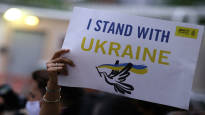Russia has sought to eradicate the identities, languages and cultures of Ukrainians and Crimean Tatars.
A recent report by the human rights organization Amnesty says that Russia has systematically tried to suppress Ukrainian and Tatar communities from Ukraine on the Crimean peninsula, which it conquered a decade ago.
Amnesty says that Russia has sought to eradicate the identities of Ukrainians and Tatars by restricting or banning the languages and cultures of Ukrainian and Crimean Tatars.
Russia has also forcibly relocated the population from Crimea and relocated Russian civilians there.
– It seems alarmingly that the suppression of non-Russian identities is also Russia’s plan in other areas of Ukraine that it has occupied. Russia must stop suppressing and exterminating communities in its occupied territories and violating international humanitarian law and human rights norms, Amnesty International’s Ukraine researcher Patrick Thompson says in the announcement.
Authorities interfered with freedom of religion and belief
According to Amnesty’s report, after the annexation of Crimea, Russia has, for example, imposed its own curriculum on schools in the peninsula, and teachers, students and parents who opposed it have been threatened with reprisals. At the same time, the Russian authorities who arrived in the occupied area have systematically ordered to stop the teaching of the Ukrainian language.
In addition, Russia has severely restricted freedom of religion and belief in Crimea. Especially the Muslims who lived in Crimea have been subjected to serious reprisals by the authorities. The majority of Crimean Muslims are Crimean Tatars. For example, passport checks have been repeatedly carried out at mosques in Crimea in connection with Friday prayers. More than 100 Crimean Muslims have been sentenced to prison terms of up to 24 years without justification after being accused of terrorism.
Media operating in Crimea have also been subject to Russian restrictions. For example, Ukrainian-language television and radio broadcasts were already replaced by Russian-language broadcasts ten years ago, and the Crimean Tatar-language channels have also been targeted by the authorities.
